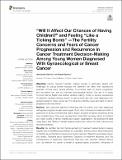"Will it affect our chances of having children?" and feeling "like a ticking bomb" —the fertility concerns and fears of cancer progression and recurrence in cancer treatment decision-making among young women diagnosed with gynaecological or breast cancer
Abstract
Objective Cancer treatment decision making process is particularly fraught with challenges for young women because the treatment can affect their reproductive potential. Among many factors affecting the process, fears of cancer progression and recurrence can also be important psychological factors. Our aim is to apply Common-Sense Model and shared decision-making model to explore experiences of treatment decision-making women of reproductive age who were diagnosed with gynaecological or breast cancer and the influence of fertility issues and fears of cancer progression and recurrence. Method We conducted telephone interviews with 24 women who were diagnosed with gynaecological or breast cancer aged 18–45, who finished active treatment within 5 years prior to study enrolment and had no known evidence of cancer recurrence at the time of participation. They were recruited from three NHS oncology clinics in Scotland and online outlets of cancer charities and support organisations. We analysed the data using Braun and Clarke's thematic analysis method as it allows for both inductive and deductive analyses. Results We identified five main themes pertaining to treatment-related decision-making experiences and fertility issues and fear of progression and recurrence: Becoming aware of infertility as a potential consequence of cancer treatment; Balancing-prioritising cancer and fertility; Decisions about treatments; Evaluation of treatment decisions; and The consequences of treatments. Sub-themes have also been reported. Different factors such as whether the cancer is breast or gynaecological, physicians' willingness of discussing fertility, influence of others in decision-making, childbearing and relationship status as well as fear of cancer recurrence emerged as important. Conclusion The importance of physicians directly addressing fertility preservation in the process of treatment decision-making and not treating it as an “add-on” was evident. Satisfaction with treatment decisions depended on both the quality of the process of decision making and its outcome. Fear of recurrence was present in different parts of the adaptation process from illness perceptions to post-treatment evaluation of decisions. Both Common-Sense Model and shared decision-making model were helpful in understanding and explaining young women's experience of treatment decision-making and fertility concerns.
Citation
Sobota , A & Ozakinci , G 2021 , ' "Will it affect our chances of having children?" and feeling "like a ticking bomb" —the fertility concerns and fears of cancer progression and recurrence in cancer treatment decision-making among young women diagnosed with gynaecological or breast cancer ' , Frontiers in Psychology , vol. 12 , 632162 . https://doi.org/10.3389/fpsyg.2021.632162
Publication
Frontiers in Psychology
Status
Peer reviewed
ISSN
1664-1078Type
Journal article
Description
Funding: AS' Ph.D. was funded by Danuta Richardson Medical Scholarship.Collections
Items in the St Andrews Research Repository are protected by copyright, with all rights reserved, unless otherwise indicated.
Related items
Showing items related by title, author, creator and subject.
-
A systematic review of the supportive care needs of people living with and beyond cancer of the colon and/or rectum
Kotronoulas, Grigorios; Papadopoulou, Constantina; Cunningham, Kathryn; Simpson, Mhairi; Maguire, Roma (2017-08) - Journal itemPurpose: Gaining a clear understanding of the health needs and concerns of people with cancer of the colon and/or rectum can help identify ways to offer a comprehensive care package. Our aim was to systematically assess ... -
Determinants of fertility issues experienced by young women diagnosed with breast or gynaecological cancer - a quantitative, cross-cultural study
Sobota, Aleksandra; Ozakinci, Gozde (2018-09-06) - Journal articleBackground. Although there is a recognition of the importance of fertility to young women with cancer, we do not know who is at risk of distress related to fertility issues following diagnosis. We investigated the determinants ... -
Does cancer type influence the impact of recurrence? : a review of the experience of patients with breast or prostate cancer recurrence
Stewart, Ross James; Humphris, Gerald Michael; Donaldson, Jayne; Cruickshank, Susanne (2021-06-29) - Journal articleObjective Patients will experience a plethora of issues when faced with a recurrence of their cancer. It is unclear if cancer type is a significant factor in how recurrence is experienced by an individual. The aim of the ...

